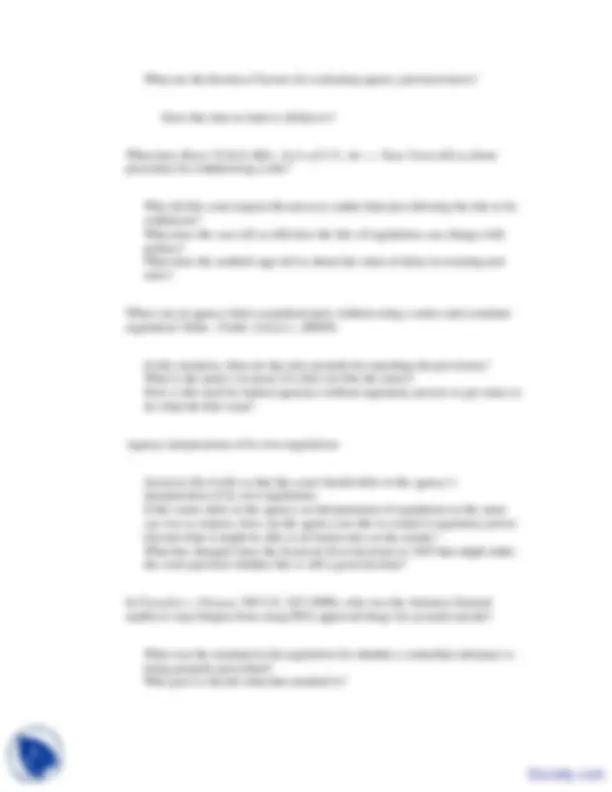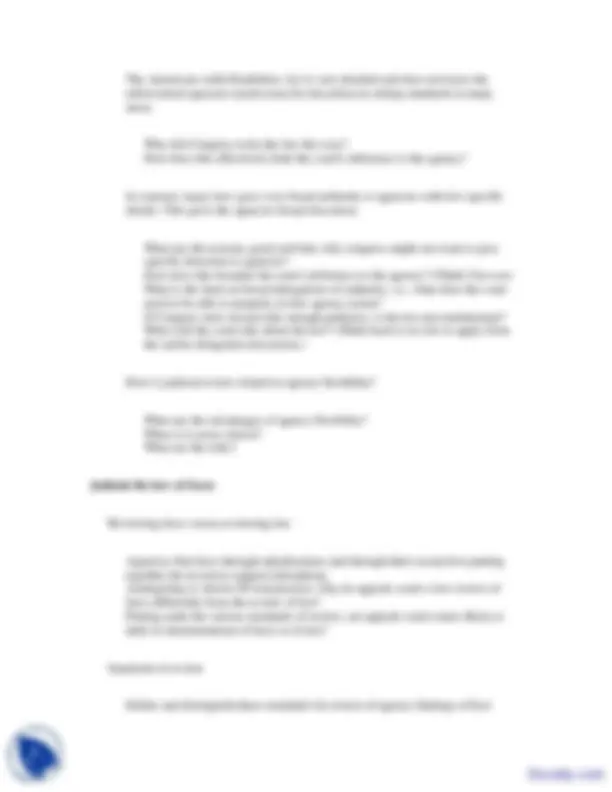






Study with the several resources on Docsity

Earn points by helping other students or get them with a premium plan


Prepare for your exams
Study with the several resources on Docsity

Earn points to download
Earn points by helping other students or get them with a premium plan
Community
Ask the community for help and clear up your study doubts
Discover the best universities in your country according to Docsity users
Free resources
Download our free guides on studying techniques, anxiety management strategies, and thesis advice from Docsity tutors
These are the review questions of Administrative law. Key important points are: Scope of Judicial Review, Primary Authority, Standard, Reviewing Facts, Civil Cases, Novo Review, Overton Park, Circuit Court, District Court, Interpretation of Law
Typology: Study notes
1 / 8

This page cannot be seen from the preview
Don't miss anything!





Chapter 7
Scope of Judicial Review
The authority for judicial review
Sec. 706 of the APA is the primary authority for judicial review. What is its basic standard for reviewing facts determined by an agency? How would you compare this standard with the preponderance of the evidence standard used in civil cases? Is this standard deferential to the agency and, if so, how does it force the court to be deferential? How does this compare with the de novo review in FOIA cases?
The Record
Why are most agency matters reviewed in Circuit Court, rather than district court? How will that affect the requirements for the agency record? What are the basic requirements for an adjudication record? How did Overton Park contribute to the modern notion of an agency record? Can the record be amended on appeal to the courts? What are the exceptions and are they commonly used?
Agency interpretation of law
How should the courts treat the agency's interpretation of what the law means?
What was the Skidmore case about? What was the standard the court used to decide how much deference to give to the agency? What was NLRB v. Hearst Publications about? How did the agency’s review of the law differ from Skidmore? What was the standard the court used to decide how much deference to give to the agency?
Chevron
What was the agency action at issue in Chevron?
How much process is involved in the action in Chevron?
What legal question was the court asked to resolve? What was step one in the court’s analysis in Chevron? What was step two in the court’s analysis in Chevron? What is Chevron deference? How does Chevron deference fit with the political control of agencies?
FDA v. Brown & Williamson Tobacco Corp ., 529 U.S. 120 (U.S. 2000)
Why does the plain language of the Food and Drug Act appear to give the agency jurisdiction over tobacco? Why did the opponents of the regulation say that the only legal result of FDA regulation would be to ban tobacco? What did the plaintiffs point to for support of their argument that the Food and Drug Act did not give the FDA jurisdiction over tobacco? What does it mean to say that the court used a Chevron step zero in this case?
What would be the usual Chevron step one in this case? What does the Court do before it decides what the plain language means?
What is legislative history and what did it show that supported the opponents of the regulations? What other agency regulates tobacco?
Is this health regulation? How does this support the opponent’s case?
What was Breyer's solution to claim that the FDA would have to ban tobacco because of the requirement that drugs be safe and effective?
Post- Chevron
What was the agency action in Mead?
How much process and finality is involved with the Mead action? How did the court explain why this lead to a different result from Chevron?
Does going first matter? ( Brand X )
Assume that a court interprets a statute before an agency promulgates regulation under the statute. When is the agency bound to follow the court’s interpretation? Must the court defer to the agency if the agency goes against the court’s original ruling when it promulgates the regulation?
Agency conflicts
In many areas, more than one agency has legal authority over a regulated activity. Which on, if any, does the court defer to?
Opinions in ligation
How do you analyze the deference issue when an agency first raises an interpretation during litigation? When might an agency’s views during litigation might be entitled to some deference?
Lawyering statutory interpretation cases
If you represent the agency, how do you present your arguments to persuade the court to support the agency interpretation? If you are opposing the agency, how do you present your arguments against deference to the agency? An agency promulgates a rule that is appropriate for most workplaces, but one industry segment cannot comply because of the structure of their workplaces. (Assume the agency must conform its rules to the workplaces, rather than force employers to restructure their workplaces.)
Can the agency avoid having the court finding the rule is arbitrary and capricious by promising not to enforce the rule against these employers? Challenging a rule can be expensive – what would you advise your client if the agency makes this offer? What would you want from the agency?
Congressional Direction to the Agency
The Americans with Disabilities Act is very detailed and does not leave the enforcement agencies much room for discretion in setting standards in many areas.
Why did Congress write the law this way? How does this effectively limit the court's deference to the agency?
In contrast, many laws gave very broad authority to agencies with few specific details. This gives the agencies broad discretion.
What are the reasons, good and bad, why congress might not want to give specific direction to agencies? How does this broaden the court's deference to the agency? (Think Chevron ) What is the limit on broad delegations of authority, i.e., what does the court need to be able to properly review agency action? If Congress does not provide enough guidance, is the law unconstitutional? What will the court rule about the law? (Think back to no law to apply from the earlier delegation discussion.)
How is judicial review related to agency flexibility?
What are the advantages of agency flexibility? When is it most critical? What are the risks?
Judicial Review of Facts
Reviewing facts versus reviewing law
Agencies find facts through adjudications and through their research in putting together the record to support rulemaking. Analogizing to Article III trial practice, why do appeals courts view review of facts differently from the review of law? Putting aside the various standards of review, are appeals courts more likely to defer to determinations of facts or of law?
Standards of review
Define and distinguish these standards for review of agency findings of fact:
How is State Farm a hard look case? What does the Seatbelt Saga teach us about the politics of agency regulations and the role of lawyers?
Factual basis for regulations
The OSHA bloodborne pathogens rule requires universal precautions in all health care workplaces
Dentists said that there was no specific factfinding about the risks in dentistry. How did the court resolve the allegation that this was arbitrary and capricious?
The rule requires employers to control risks in the health care workplace.
Why was this a problem in the home health industry? How did the court analyze the agency’s promise to not enforce the rule against this industry?
Forcing Agencies to Act
What are the limits on mandamus that make it of limited use? How does 706(1) provide an APA remedy? What is the problem with proving that agency action has been unlawfully or unreasonable withheld - how is the choice to act a discretionary function?
What might be valid reasons for the agency to not act? What legal process got the plaintiffs into court in Mass v. EPA? What might have been an appropriate response to the petition in Mass v. EPA , short of proposing greenhouse gas regulations?
Relying on Agency Advice
When can you claim equitable estoppel for relying on agency advice? Can you get damages? What can it be a defense for? How does the formality of the advice matter?
Example of when you can rely?
Can you rely on an agency mistake about the law or regulation?
Jurisprudentially, why not?
Non-Acquiesce
If an appeals court disagrees with an agency’s interpretation of law in an adjudication, can the agency relitigate the same interpretation in other adjudications with different parties? If an appeals court finds that the agency has promulgated an improper rule, can the agency keep using the rule in other circuits?
Does the basis for overruling the regulation matter? If not, why is it different from the court overruling adjudication?